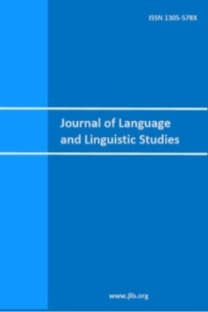Does being taught by native English-speaking teachers promote improvement in speaking skill more?
Öz
Please fill up the following information accurately. (Please
use Times New Roman, 12 pt.
Does being taught by native English-speaking teachers promote improvement in speaking skill more?
___
Adıgüzel, O. C., & Özdoğru, F. (2017). Effects of Turkish and English speaking teachers on students’ foreign language skills. Kastamonu Education Journal. 25(1). 172-186.Benke, E., & Medgyes, P. (2006). Differences in teaching behaviour between native and non-native speaker teachers: As seen by the learners. E. Llurda (Ed.) Non-native language teachers, challenges and contributions to the profession (pp. 195-215). New York: Springer.
Boonkit, K. (2010). Enhancing the development of speaking skill for non-native speakers of English. Procedia Social and Behavioral Sciences, 2(2), 1305-1309.
Bygate, M. (2010). Speaking. Oxford: Oxford University Press. Cepik, S., & Yastıbaş, A. E. (2013). The use of e-portfolio to improve English speaking skill of Turkish EFL learners. The Anthropologist, 1(2), 307-317.
Creswell, J. W. (2012). Educational research: Planning, conducting and evaluating quantitative and qualitative research. Boston: Pearson.
Díaz, N. R. (2015). Students’ preferences regarding native and non-native teachers of English at a university in the French Brittany. Procedia-Social and Behavioral Sciences, 173, 93-97.
Dowling, F. (1957). Teaching impromptu speaking. The Speech Teacher, 6(3), 205-208.
Ebadi, S., & Asakereh, A. (2017). Developing EFL learners’ speaking skills through dynamic assessment: A case of a beginner and an advanced learner. Cogent Education, 4(1), 1-18.
Feuer, M. J., Towne, L., & Shavelson, R. J. (2002). Scientific culture and educational research. Educational Researcher, 31(8), 4-14.
Forbes, K., & Fisher, L. (2018). The impact of expanding advanced level secondary school students’ awareness and use of metacognitive learning strategies on confidence and proficiency in foreign language speaking skills. The Language Learning Journal, 46(2), 173-185.
Gan, Z. (2013). Understanding English speaking difficulties: An investigation of two Chinese populations. Journal of Multilingual and Multicultural Development, 34(3), 231-248.
Gonzales, J. J. V. (2016). Self-perceived non-nativeness in prospective English teachers’ self-images. RBLA, 16(3), 461-491.
Gonzales, E. R., & Castaneda, M. E. (2018). The effects and perceptions of trained peer feedback in L2 speaking: Impact on revision and speaking quality. Innovation in Language Learning Teaching, 12(2), 120-136.
Guerra, L. (2009). Teaching and Learning English as an International Language in Portugal. Policy, Practice and Perceptions. Saarbrücken: VDM Verlag.
Guerra, L. (2017). Students’ perceptions and expectations of native and non-native speaking teachers. J. D. D. M. , Agudo (Ed.). Native and non-native teachers in English language classrooms (pp. 183-205). Boston: Walter de Gruyter Inc.
Gupta, W., & Stern, C. (2015). Comparative effectiveness of speaking vs. listening in improving spoken language of disadvantaged young children. The Journal of Experimental Education, 38(1), 54-57.
Hassani, K., Nahvi, A., & Ahmadi, A. (2013). Design and implementation of an intelligent virtual environment for improving speaking and listening skills. Interactive Learning Environments, 24(1), 252-271.
Hayward, P. A. (2017). Incorporating TED Talk assignments into a public-speaking course. Communication Journal, 31(4), 239-244.
Hudges, R. (2011). Teaching and researching speaking. Edinburgh: Pearson Education Limited.
Hunter, K. M., Westwick, J. N., & Haleta, L. L. (2014). Assessing success: The impacts of a fundamentals of speech course on decreasing public speaking anxiety. Communication Education, 63(2), 124-135.
Lasagabaster, D., & Sierra, J. M. What do students think about the pros and cons of having a native speaker. E. Llurda (Ed.) Non-native language teachers, challenges and contributions to the profession (pp. 217-241). New York: Springer.
Lewis, J., Sonsaat, S., Link, S., & Barriuso, T. A. (2016). Native and nonnative teachers of L2 pronunciation: Effects on learner performance. TESOL Quarterly, 50(4), 894-931.
Medgyes, P. (1992). Native or non-native: who's worth more? English Language Teaching Journal, 46 (4), 340-49.
Lewis, J., Sonsaat, S., & Link, S. (2017). Students’ beliefs about native and non-native pronunciation teachers. J. D. D. M. , Agudo (Ed.). Native and non-native teachers in English language classrooms (pp. 183-205). Boston: Walter de Gruyter Inc 205-237.
Llurda, E., & Huguet, A. (2003). Self-awareness in NNS EFL primary and secondary school teachers. Language Awareness, 12(3&4), 220-233.
Mahfouz, S. M., Ihmeideh, F. M., (2009). Attitudes of Jordanian university students towards using online chat discourse with native speakers of English for improving their language proficiency. Computer Assisted Language Learning, 22(3), 207-227.
Nation, I. S. P., & Newton, J. (2009). Teaching ESL/EFL Listening and Speaking. New York: Routledge.
Reves, T., & Medgyes, P. (1994). The non-native English speaking EFL/ESL teachers’ self-image: An international survey. System, 22(3), 353-367.
Richards, J. C. (2008). Teaching listening and speaking: From theory to practice. Cambridge: Cambridge University Press.
Slavin, R. E. (2002). Evidence-based education policies: Transforming educational practice and research. Educational Researchers, 31(7), 15-22.
Samimy, R., & Brutt-Griffler, J. (1999). To be a native or nonnative speaker: Perceptions of "nonnative" students in a graduate TESOL program. In G. Braine (Ed.), Nonnative educators in English language teaching (pp. 127-144). Mahwah, NJ: Lawrence Erlbaum.
Sun, Z., Lin, C. H., You, J., Shen, H. J. Qi, S., & Luo, L. (2017). Improving the English speaking skills of young learners through mobile social networking. Computer Assisted Language Learning, 3(4), 304-324.
Uchihara, T., & Saito, K. (2016). Exploring the relationship between productive vocabulary knowledge and second language oral ability. The language learning Journal, 47(1), 64-75.
Uztosun, M. S., Skinner, N., & Cadorath, J. (2014). An action research study designed to implement student negotiation to improve speaking classroom practice in Turkey. Educational Action Research, 22(4), 488-504. Zou, B. (2013). Teachers’ support in using computers for developing students’ listening and speaking skills in pre-sessional English courses. Computer Assisted Language Learning, 26(1), 83-99.
- ISSN: 1305-578X
- Yayın Aralığı: Yılda 4 Sayı
- Yayıncı: Hacettepe Üniversitesi
Sayıdaki Diğer Makaleler
Identification of translation procedures for culture specific items in a short story
Student teachers’ attitudes towards the compulsory English courses at the Turkish universities
Mehmet ALTIN, Asuman Seda SARACAOĞLU
Review of studies focused on bilingualism
ELT formation course program and pre-service teachers’ perceptions of self-disclosure
Teaching in culturally and linguistically diverse classrooms: Turkish EFL instructors’ experience
